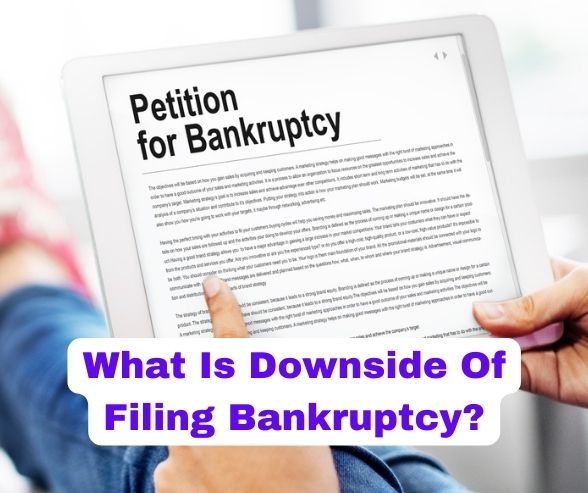Cons Of Filing Bankruptcy
Which Is A Drawback To Declaring Bankruptcy?
The reason why bankruptcy is considered an option of last resort because it has some downsides. While bankruptcy can give you a fresh start or make it easier to pay off your debts, you cannot jump in without knowing what to expect. The consequences of filing are determined by whether you file for Chapter 7 or Chapter 13 bankruptcy.
Chapter 7 Bankruptcy Downsides You Should Know
What Are Some Potential Negative Outcomes Of Filing For Bankruptcy?
 The following are some of the downsides of filing for bankruptcy:
The following are some of the downsides of filing for bankruptcy:
- You may not be eligible: Not everyone can file for bankruptcy. To file Chapter 7, you must pass the Chapter 7 means test, which determines whether your income is low enough to qualify. If your income is too high, you may qualify to file Chapter 13.
- Your property may be sold off: There are exempt assets that a trustee cannot sell for the benefit of creditors. These are assets covered by your state’s bankruptcy exemptions. Any assets not protected by these exemptions such as luxury items, recreational vehicles, pricy sports equipment, and even rental property can be sold by the trustee.
- Your business may have to close: When you file for Chapter 7 bankruptcy, you must use a bankruptcy exemption to protect your business interest. You don’t have to do this if your business is service-oriented or you are a sole proprietor.
- You may still be in debt after Chapter 7: A Chapter 7 bankruptcy basically erases all your unsecured debt. But you still have to pay back recent tax debt, child support, student loans, and alimony. These are called non-dischargeable debts.
- Your bank accounts will be affected: The money in your checking or savings account will be taken when filing for bankruptcy. This is why you need to keep the balance in your bank account low before you file. Banks often allow institutions to withdraw funds from bank accounts to pay off debt.
- Your cosigner still has an obligation to pay: While filing bankruptcy can help you avoid paying all or most of what you owe, your cosigner is not protected by your bankruptcy.
- Your credit score will be affected: Filing for bankruptcy makes it harder to borrow in the future because your credit score will drop. But rebuilding your credit score is not that hard after filing for bankruptcy. In fact, you will start receiving offers for credit cards as soon as your bankruptcy case closes.
- Renting will be tough: Finding a place to live is going to be tough if you filed for bankruptcy. This is because properties run by property managers often don’t rent to people who recently filed for bankruptcy.
Downsides Of Filing For Chapter 13 Bankruptcy
Disadvantages Of Filing Bankruptcy
Filing for Chapter 13 has the following downsides:
- It takes you up to five years to complete Chapter 13 while it only takes four months for Chapter 7
- You still have to pay back your creditors including your credit card balances and medical bills
- Sticking to a budget will be harder because all your disposable income will be used to pay your creditors
- The Chapter 13 bankruptcy will affect your credit score because it remains on your record for 7 years